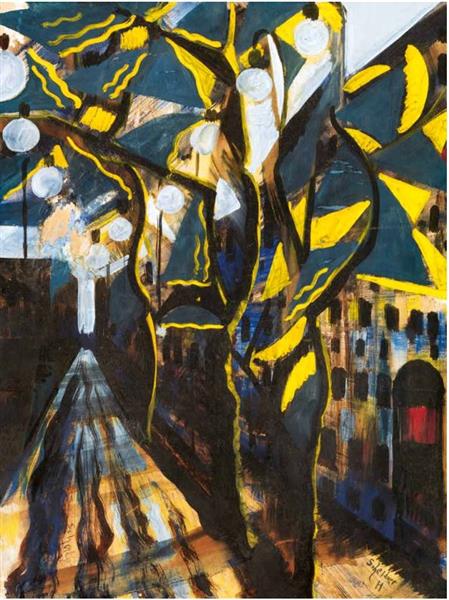Description
The work "Nagyváros" by Hugó Scheiber is a vibrant emblem of the vibrant urban energy and a palpable manifestation of the expressionist style that characterized much of its artistic production. Scheiber, an active Hungarian artist during the first decades of the twentieth century, was a prominent figure in the scene of modern art of his time, and this painting is testimony of his mastery in the representation of life in the city.
When observing the composition of "Nagyváros," one is immediately impacted by dynamism and tension inherent in painting. The explosion of geometric shapes and angular lines evokes the acceleration and perpetual movement of the urban environment. Scheiber uses a careful disposal of elements that converge and diverge into a pattern that suggests both the speed and the chaos of the city rhythm. This approach gives the work a film quality, almost like a motionless frame that captures the ephemeral essence of an instant in urban life.
The use of color in "Nagyváros" is particularly notable. Scheiber adopts a vibrant and contrasting palette, with predominance of intense reds, bright yellow and dark tones that accentuate the sensation of depth and spatial complexity. These colors not only enhance the mathematical structure of painting, but also transmit emotions found: energy, vitality and, at the same time, confusion and overwhelmed that can characterize life in a great city.
In the center of the work, a series of stylized human figures move in different directions, almost as if they were absorbed by the framework of the city itself. These figures are not accurately outlined; Rather, they are integrated into the abstract composition, suggesting their anonymity and the lack of individuality in the massive context of the city. The depersonalization of the characters is an eloquent comment on urban alienation, a recurring theme in Scheiber's work.
Another significant aspect of "Nagyváros" is the influence of futurism, an artistic movement that glorified speed, technology and modernity. Scheiber, although not strictly identified as a futuristic, shows in this work a clear fascination for those same issues. The repetition of mechanical forms and the feeling of dynamic movement in painting are direct reminiscences of futuristic aesthetics.
The story of Hugó Scheiber is equally fascinating. Born in Budapest in 1873, Scheiber initially trained at the Budapest School of Applied Arts. Throughout his career, he traveled through Europe and soaked from the various artistic currents of his time. His participation in the Independent Art Movement Die Neue Sachlichkeit in Berlin was crucial for the development of his unique style, which combines elements of expressionism, cubism and futurism.
In summary, "Nagyváros" is a masterpiece that encapsulates the complexity and intensity of urban life through a brilliant synthesis of way, color and emotional content. Hugó Scheiber, through this painting, not only captures a moment in time, but also offers deep meditation on the nature of human experience in modernity. The work remains relevant today, not only for its aesthetic value, but also for its ability to resonate with our own life experiences in the accelerated contemporary urban environment.
KUADROS ©, a famous paint on your wall.
Hand-made oil painting reproductions, with the quality of professional artists and the distinctive seal of KUADROS ©.
Art reproduction service with satisfaction guarantee. If you are not completely satisfied with the replica of your painting, we refund your money 100%.

